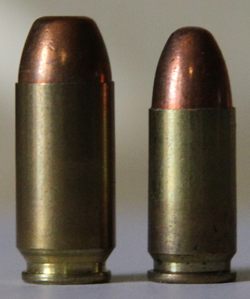.41 Action Express
| .41 Action Express | ||||||||||||||||
|---|---|---|---|---|---|---|---|---|---|---|---|---|---|---|---|---|

A .41 AE cartridge next to a 9×19mm Luger cartridge for size comparison.
|
||||||||||||||||
| Type | Handgun | |||||||||||||||
| Place of origin | United States, Israel | |||||||||||||||
| Production history | ||||||||||||||||
| Designer | Evan Whildin | |||||||||||||||
| Designed | 1986 | |||||||||||||||
| Manufacturer | Action Arms | |||||||||||||||
| Specifications | ||||||||||||||||
| Case type | Rebated rim, straight wall | |||||||||||||||
| Bullet diameter | .410 in (10.4 mm) | |||||||||||||||
| Neck diameter | .434 in (11.0 mm) | |||||||||||||||
| Base diameter | .435 in (11.0 mm) | |||||||||||||||
| Rim diameter | .394 in (10.0 mm) | |||||||||||||||
| Rim thickness | .045 in (1.1 mm) | |||||||||||||||
| Case length | .866 in (22.0 mm) | |||||||||||||||
| Overall length | 1.17 in (30 mm) | |||||||||||||||
| Case capacity | 21.60 gr H2O (1.400 cm3) | |||||||||||||||
| Rifling twist | 1 in 14.2 in (360 mm) | |||||||||||||||
| Primer type | Small pistol | |||||||||||||||
| Maximum pressure | 32,600 psi (225 MPa) | |||||||||||||||
| Ballistic performance | ||||||||||||||||
|
||||||||||||||||
| Source(s): Hodgdon | ||||||||||||||||
The .41 Action Express is a pistol cartridge developed in 1986 to reproduce the performance of the .41 Magnum police load (which is a weaker-than-standard load) in semi-automatic pistols.
The .41 Action Express was designed by Evan Whildin, vice president of Action Arms, in 1986. It was based on the .41 Magnum case, cut down to fit in a 9mmP frame, and using a rebated rim. Performance was compared to the ballistics of the 41 Magnum police load. The .41 AE was thought to be a very attractive concept, as the rebated rim allows a simple change of barrel, mainspring, and magazine to convert many 9mm guns to 41 AE.
The powerful 10mm Auto cartridge, which had been suffering from poor acceptance from its start in the early 1980s, was eventually accepted by the FBI in a reduced power, subsonic loading. Smith & Wesson then decided the 10mm Auto was too much cartridge for the reduced power loading, and that the .45 ACP sized guns that chambered it were too heavy and bulky; out of this came the .40 S&W, a shortened 10mm Auto case, designed to fit in a 9mm-sized gun, with a reduced pressure loading that allowed a lighter, easier to shoot gun. Because most ammunition manufacturers backed the .40 S&W, there was little use for the very similar .41 AE, so production of both firearms and ammunition was soon phased out.
The .41 AE was doomed by circumstance to obscurity, but the concept of using a rebated rim to allow easy cartridge interchangeability was not lost. The .50 Action Express, developed by Magnum Research for the Desert Eagle pistol, uses a similar rebated rim that is the same diameter as the .44 Magnum. This allows a caliber change with replacement of just the barrel and magazine.
The .41 AE can be ballistically similar to the .40 S&W, to the point that many reloading manuals suggest using .40 S&W load data in the .41 AE. Original IMI factory cartridges are much higher powered, pushing a 170 gr (11.02 g) bullet at 1215 ft/s. The .41 AE uses 0.410-inch (10.4 mm) bullets, whereas the .40 S&W uses 0.400-inch (10.2 mm) bullets. However, as it lacks the backing of ammunition manufacturers in making .410 caliber bullets suited to semiautomatic pistols, the .41 AE has not achieved widespread popularity.
...
Wikipedia
